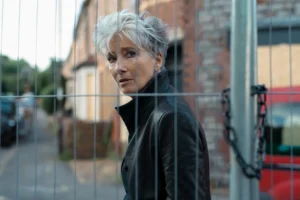Summary
My Father’s Violin is a heartfelt, uninspired drama.
Just because a film has been done a million times over doesn’t mean it won’t be good; it just has to be made entirely, performed, and perhaps viewed from a different angle. Here, the Netflix film My Father’s Violin views the heartfelt drama through various cultural lenses, hoping for a different result. Unfortunately, this is nothing more than an exercise in washing away a regional uniqueness that could have made the film feel fresh.
The Turkish film “Babamin Kemani” centers its story around a concert conductor, Mehmet (Engin Altan Düzyatan), and the niece he hardly knows. That’s because he was estranged from his brother, who now has become very ill.
His wish before he dies? For Mehmet to take care of his daughter, Özlem (the adorable newcomer Gülizar Nisa Uray). Why? Because he is dying of pancreatic cancer.
This sets the stage for a “heartwarming” variety genre. You know the kind. Where they are supposed to pull the heartstrings as both Mehmet and his niece form a bond over music so they can mutually grieve for the loss of his brother.
Oddly, however, this never happens here. Only now, his brother has now died. Social services will not give her over to the band so they can remake Three Men and a Little Lady. Now Mehmet must take her in, and the Gutes are nowhere to be found.
Can one care for a relative he does not want or lose the brother he was not close to? Writer and director Andaç Haznedaroglu attempts to show the difference by using Mehment’s wife, Suna (played by the luminous Belçim Bilgin), to show him the meaning of family is puzzling, and perhaps, even heartless that he needs a lesson like this in compassion.
My Father’s Violin almost immediately begins to falter because of the film’s dull dialogue. For instance, when we meet the couple after a successful opening concert. The odd back and forth of, “No, I’m the lucky one” is nothing more than a contrived setup you have seen millions of times. How?
It will establish by the end of the film Mehmant’s character arc. Will he create a new musical piece, or will he take his time with his new fatherless niece?
There is even the scene to open the film where Turkish police chase Özlem, her father, and his troupe through a quaint village that plods for an excessive amount of time. (Watch as the young, healthy cops have to slow down their jog as the older men and little girl run away at a snail’s pace). While the director of photography, Firat Lita Sözbir, beautifully shoots the film, they lost an opportunity to make that a distinct trait or even a distinct character of its own.
My Father’s Violin attempts to make up ground with the genre penchant for manipulating heartstrings; since Mehmet is so against establishing a connection at first, his turnaround is moving and heartfelt. Even a bit nuanced considering Düzyatan’s talent that he draws out of a lackluster script.
That’s not enough, however. Haznedaroglu’s film is too centered on Mehment’s journey as you wait to see how Özlem deals with her loss, which never comes as if she would be happy to have shelter and food for the time being. It seems to be more about him finding common ground with his young niece than him winning over her trust. He’s a man-child who doesn’t want to grow up.
The most obvious comparison you can make for a film like this is the Award-winning Kolya. And when the film tries to win us over with a big scene, it’s moving towards, and frankly banking on, it doesn’t land the way it should. Nor does the forced ending of Mehmet finding clarity, which is unnatural and overdone. While we can rejoice in the main character finding his soul, My Father’s Violin is still trying to locate its own.




